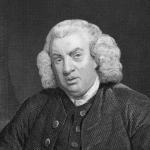I came here, being stricken, stumbling out
At last from streets; the sun, decreasing, took me
For days, the time being the last of autumn,
The thickets not yet stark, but quivering
With tiny colors, like some brush strokes in
The manner of the pointillists; small yellows
Dart shaped, little reds in different pattern,
Clicks and notches of color on threaded bushes,
A cracked and fluent heaven, and a brown earth.
I had these, and my food and sleep—enough.
This is a countryside of roofless houses,—
Taverns to rain,—doorsteps of millstones, lintels
Leaning and delicate, foundations sprung to lilacs.
Orchards where boughs like roots strike into the sky.
Here I could well devise the journey to nothing,
At night getting down from the wagon by the black barns,
The zenith a point of darkness, breaking to bits,
Showering motionless stars over the houses.
Scenes relentless—the black and white grooves of a woodcut.
But why the journey to nothing or any desire?
Why the heart taken by even senseless adventure,
The goal a coffer of dust? Give my mouth to the air,
Let arrogant pain lick my flesh with a tongue
Rough as a cat’s; remember the smell of cold mornings,
The dried beauty of women, the exquisite skin
Under the chins of young girls, young men’s rough beards,—
The cringing promise of this one, that one’s apology
For the knife struck down to the bone, gladioli in sick rooms,
Asters and dahlias, flowers like ruches, rosettes. . .
Forever enough to part grass over the stones
By some brook or well, the lovely seed-shedding stalks;
To hear in the single wind diverse branches
Repeating their sounds to the sky—that sky like scaled mackerel,
Fleeing the fields—to be defended from silence,
To feel my body as arid, as safe as a twig
Broken away from whatever growth could snare it
Up to a spring, or hold it softly in summer
Or beat it under in snow.
I must get well.
Walk on strong legs, leap the hurdles of sense,
Reason again, come back to my old patchwork logic,
Addition, subtraction, money, clothes, clocks,
Memories (freesias, smelling slightly of snow and of flesh
In a room with blue curtains) ambition, despair.
I must feel again who had given feeling over,
Challenge laughter, take tears, play the piano,
Form judgments, blame a crude world for disaster.
To escape is nothing. Not to escape is nothing.
The farmer’s wife stands with a halo of darkness
Rounding her head. water drips in the kitchen
Tapping the sink. To-day the maples have split
Limb from the trunk with the ice, a fresh wooden wound.
The vines are distorted with ice, ice burdens the breaking
Roofs I have told you of.



















Comment form: